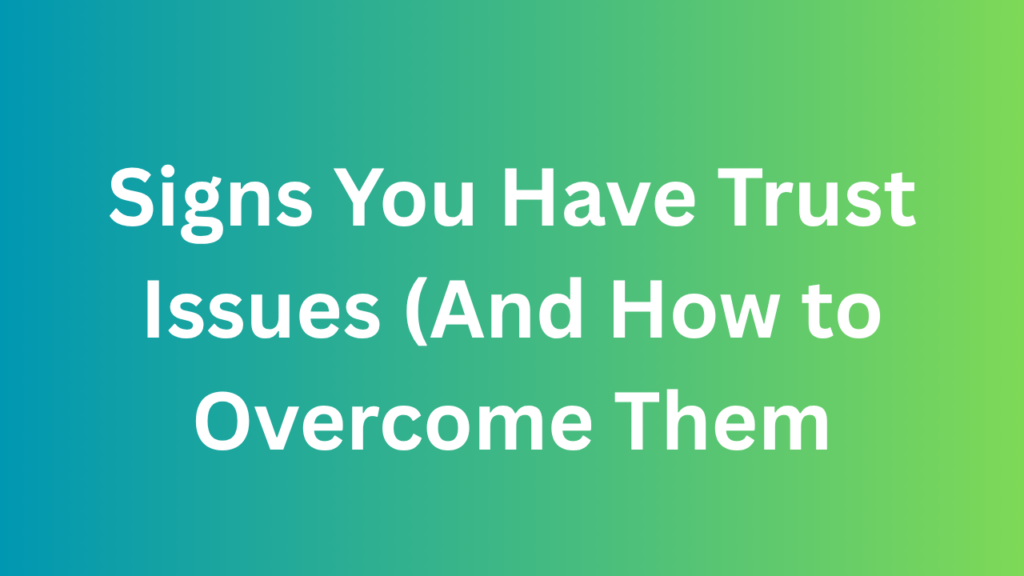Trust is the foundation of every meaningful relationship — whether romantic, platonic, or professional. But if you’ve been hurt, betrayed, or disappointed in the past, trusting again can feel terrifying. You might find yourself constantly questioning people’s intentions, overthinking every interaction, or even pushing others away to protect your heart.
Sound familiar?
If you suspect you may have trust issues, the good news is: you’re not broken — you’re human. And more importantly, healing is possible.
In this post, we’ll explore the common signs of trust issues, where they often come from, and practical steps to start rebuilding trust — in others and in yourself.
🚩 Signs You Might Have Trust Issues
You don’t need to check every box to know this applies to you — but if several of these feel relatable, it may be time to look inward.
1. You Overthink Everything
You’re constantly analyzing what people say and do, looking for hidden meanings or signs that they might betray you.
“Why didn’t they text back yet?”
“Were they really busy, or are they losing interest?”
2. You Expect the Worst
You struggle to believe that someone’s intentions are pure. Instead, you often assume they’re lying, hiding something, or about to hurt you.
“It’s only a matter of time before they cheat, lie, or leave.”
3. You Find It Hard to Be Vulnerable
Opening up feels risky. You keep your emotions guarded because you fear being judged, rejected, or emotionally abandoned.
You say, “I’m fine,” even when you’re clearly not.
4. You Sabotage Relationships
When things are going well, you might push people away, pick fights, or test their loyalty — unconsciously trying to prove that they’ll hurt you eventually.
“If they leave after this, they were never meant to stay anyway.”
5. You Keep a Wall Up — Even With People You Love
Even in close relationships, you may find it difficult to truly relax, let your guard down, or believe that someone loves you unconditionally.
You think, “They’ll stop loving me once they really know me.”
6. You Need Constant Reassurance
You often need validation to feel secure, asking repeated questions like:
- “Do you still love me?”
- “Are you sure you’re not mad at me?”
- “Why didn’t you reply sooner?”
💔 Where Trust Issues Come From
Understanding the root cause of your trust struggles is key to healing. Common sources include:
• Past Betrayals
Infidelity, broken promises, or being lied to — especially in past relationships — can leave emotional scars.
• Childhood Trauma
If you grew up in an unstable or emotionally unsafe environment, you may have learned that people (even those who are supposed to protect you) aren’t reliable.
• Toxic Relationships
Manipulation, gaslighting, and emotional abuse can destroy your sense of reality and make it hard to trust yourself or others again.
• Low Self-Esteem
If you struggle with feeling “not good enough,” you might assume people will eventually see your flaws and leave.
🌱 How to Overcome Trust Issues
Healing takes time, intention, and often discomfort — but it’s deeply worth it. Here are steps you can take to begin the journey:
1. Start With Self-Trust
You can’t fully trust others if you don’t trust yourself.
- Honor your instincts, but learn to distinguish fear from intuition.
- Keep small promises to yourself — like showing up for your own needs.
- Affirm your worth daily.
- Reflect: “Do I trust myself to survive being hurt?”
When you believe in your ability to cope, you stop needing control over others.
2. Communicate Openly (Even When It’s Hard)
If someone you love has earned your trust but you still struggle, let them in on what you’re feeling — gently and honestly.
You could say:
“I sometimes get triggered because of past experiences. I’m working on it, but I wanted you to know.”
This invites understanding instead of confusion or conflict.
3. Challenge Negative Thoughts
When you catch yourself spiraling into doubt or suspicion, ask:
- What evidence do I have for this fear?
- What’s another possible explanation?
- Have they given me a reason not to trust them — or am I projecting the past?
Your thoughts are valid, but not always true.
4. Set Healthy Boundaries (Not Walls)
Boundaries are about protection with connection, not disconnection. Learn to say:
- “I’m not ready to talk about that yet.”
- “I need some space to process.”
- “I’d like to revisit this when I’m calmer.”
Boundaries keep relationships respectful — and trustable.
5. Allow People to Earn Your Trust Gradually
You don’t have to jump in with blind faith. Let trust be built in small, consistent steps.
- Observe how they handle your vulnerability.
- Pay attention to how they respond when you’re upset.
- Notice if they follow through on what they say.
Trust isn’t about perfection — it’s about patterns.
6. Consider Therapy or Support Groups
Trust issues are often rooted in trauma or deeply ingrained belief systems. A licensed therapist can help you:
- Reframe your trust blueprint
- Heal old emotional wounds
- Practice safe vulnerability
It’s okay to ask for help. In fact, it’s a sign of strength.
7. Practice Patience With Yourself
You won’t overcome trust issues overnight — and you don’t need to rush.
Celebrate progress:
- Opening up more than you did last time
- Not overreacting to a trigger
- Choosing to believe the best in someone
Healing happens in micro-moments.
Final Thoughts: Trust Can Be Rebuilt — One Brave Step at a Time
Having trust issues doesn’t mean you’re unlovable or damaged. It means you’ve been hurt — and your mind is trying to protect you.
But staying in protection mode can also keep love, connection, and peace at arm’s length.
You deserve healthy relationships where you feel safe, heard, and supported. And you deserve to trust — both others and yourself — again.
With self-awareness, courage, and compassion, you can heal. And the love you’ll experience on the other side of that healing? It’s deeper, stronger, and more beautiful than ever before.
Your Turn:
Have you struggled with trust in relationships? What helped you start healing? Share your story in the comments — your voice could be the encouragement someone else needs today.



